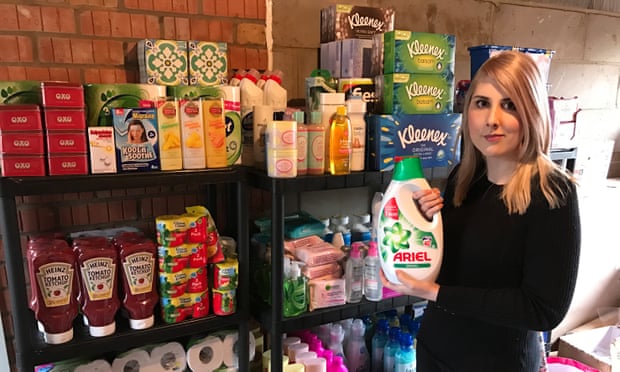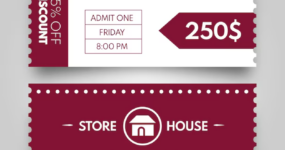She films herself at the till, actually using the coupons she has found. “Some people worry coupons you need to print off at home won’t work in the shops and fear being embarrassed in public. I carry each supermarket’s coupon policy in my purse, and I show my Facebook viewers exactly how to get a manager to intervene if there is a problem and if a valid coupon is initially refused.”
As well as hunting down coupons online, she also regularly posts birthday, Christmas and New Year greetings cards to brands she likes. “Most brands print a freepost address on their packaging, and you can get five cards for £1 in the poundshop.
“Two-thirds of the time I’ve found if you wish a brand a happy birthday, say you’re a loyal customer and include your postal address, they will send you at least one coupon – or as many as 20.”
Once, she sent well-known sausage brand a card with a drawing of a farm her children had made. In response, the company sent her a hamper with £200-worth of sausages inside it (she gave most of it away to charity). Other brands have given her three years’ supply of washing tablets and four years’ supply of toilet rolls.
“I have a large chest freezer and my entire garage is now a stockpile where I put the stuff that I get for free. Each £1 saved with a coupon, I put in a savings account.” She has saved around £12,000 on her food bill in the last couple of years. “I’ve discovered food definitely tastes better when it’s free.”
Facebook Twitter Pinterest
Neil Wright saves £1,000 a year using cashback websites. Photograph: Murdo Macleod for the Guardian
Wright, 29, lives in West Lothian. He started using cashback websites five years ago and is now an avid user, visiting Topcashback, his favourite site, at least two or three times a week. It saves him around £1,000 a year. “Every single time I want to buy something, I check which retailer is the cheapest, then whether I can get cashback on my purchase. Around 70% of the time, I find I can make the transaction cheaper.”
To date, he has earned nearly £5,200 from Topcashback and £825 from its rival site, Quidco. He has also earned £140 via the Kidstart site, which is generally less competitive than the other two but unlike them offers cashback at John Lewis and Amazon.
By clicking through to a retailer from a cashback website, he earns between 1% and 10% cashback on everything he buys from that retailer. He then uses his Asda credit card to pay for it, and gets an additional 1% cashback on top.
“I’ve always been keen on a bargain and it frustrates me that other people can’t be bothered to do what I do,” says Wright. “I think they’re missing a trick. It only takes an extra minute or two.”
He sets himself reminders to shop around annually for new insurance, mobile phone, cable TV and utility providers, and always switches provider via a cashback website. “I once managed to get so much cashback from switching my broadband, it effectively meant my broadband bill for a year was only £10. Another time, I earned £250 just by taking out a new life insurance policy.”
Facebook Twitter Pinterest
Debra Law buys food past its best-before date. Photograph: Murdo Macleod for the Guardian
Almost a decade ago Law, who is 56, started buying discounted food online that was nearing or past its best-before date, or had been rejected by high street stores because of its packaging. “I once bought two boxes of Black Magic chocolates for a penny each,” she says. “I would have bought more, but you were only allowed to buy a maximum of two per person.”
Law, who lives in Aberdeen, estimates 25% of the food she buys has already passed its best-before date, and the rest will typically officially cease to be at its best within a month. “I tell everybody I know to do what I do. I don’t think there’s any difference in the quality. I’ve always kept my food until I’ve used it. The best-before date doesn’t bother me.”
It is perfectly legal to sell food which is past its best-before date, and eating food that is past that is unlikely to be a health risk, according to the Food Standards Agency – only use-by dates relate to food safety.
Two websites, Approved Food and Clearance XL, dominate the online market for out-of-date food, and Law regularly shops at both of them. In the last couple of years, she has saved more than £15,000 on food that would normally have retailed for over £22,000. She checks the Approved Food website every single day for bargains – stock typically sells out in a matter of hours – and Clearance XL once a week. Law always buys in bulk because she has to pay around £5 for each delivery. As a result, she says, she currently has 24 cans of soft drinks, 60 different sauces, 10 cans of soup, 100 packets of crisps and every kind of cake mix under the sun – all nearing or past their best-before dates. “Everything I buy would cost at least double if it was sold in a supermarket,” she says. “I’m housebound, in a wheelchair, and I live on a tight budget because I rely on disability benefits for my entire income. Knowing I have enough food gives me peace of mind, and the food I buy online saves me money I cannot afford to spend.”
[“Source-theguardian”]




























